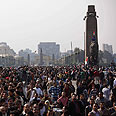
The instability in the Arab world has grown exponentially and Western leaders are confused about what they should do. In such a situation some of them are likely to repeat even more forcefully the few things they can say where nobody can prove them clearly wrong. Israeli authorities have to follow early signals of this. One such signal was a statement made by German Chancellor Angela Merkel during her visit here. She appealed to Israel to take constructive steps toward reinvigorating the Middle East peace process.
After what is happening now in Egypt, Israel can even less afford to take risks for a doubtful “peace,” with the Palestinians. There are two clear key messages Israel has to stress in its public diplomacy. The first is that the major unrest in Egypt shows that peace treaties with Arab countries are not assured, as they are concluded with non-democratic rulers. Security issues thus become even more important for Israel.
In times of great uncertainty in the region, a responsible government should not increase this by adopting agreements with a Palestinian partner who may be overthrown in the near future. The Palestinian Authority’s leaders now deny they were willing to make the concessions disclosed by PaliLeaks. This demonstrates once again that the nature of agreements with rulers whose status is doubtful is radically different from agreements with a democracy.
Continued international focus
The second clear message to convey is that the Palestinian-Israeli conflict is not at all at the heart of the instability in the Arab and Muslim world. Pushing for a rapid “peace” will not stabilize these countries. Rather than the Palestinian-Israeli conflict influencing the region in a major way, it is greatly influenced by what happens in the region.
This was evident for a long time for anyone who was willing to see it. It has become even clearer due to the recent events. Not one less person would have immolated himself in recent weeks had there been Palestinian-Israeli peace. Not a single Tunisian, Egyptian or Jordanian would have stayed home during the recent mass protests, had there been such a peace.
Similarly strong statements can be made about the future. The reciprocal murders between Shiites and Sunnis and the tensions between these two currents of Islam will not go away. The driving out and occasional murder of Christians from Arab and Muslim lands will not stop. Whether the public order in Pakistan collapses or does not, will be totally unrelated to the Palestinian-Israeli conflict. That Iran will decide whether to go ahead with completing its atom bomb as a function of the status of the Palestinian-Israeli conflict is a figment of the fantasy of fools.
Most of these arguments are not new. In the past however, specific problems including suicide bombings in the region drew only limited attention for a short period as there are so many other problems in the world to worry about. What is new is that now there will be a continued international focus for a substantial time to come on this region. This also makes it possible to stress Israel’s arguments in an ongoing way.
The next question is then, what should Israel’s friends do in their respective countries? It would be wrong to dissipate one’s forces on a broad front. It will be probably far more effective to expose the misjudgment of a few prominent false pundits in each Western country, who have failed to understand the region and focused on the Palestinian-Israeli side issue. Discrediting them may give others second thoughts.
The current instability gives Israeli public diplomacy a major chance to start partly anew. The downside risk of failing to grasp this opportunity is however also much greater now.
Dr. Manfred Gerstenfeld has published 19 books, several of which deal with Israel’s international relations.
- Follow Ynetnews on Facebook















